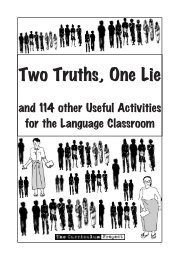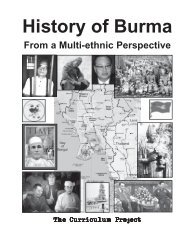Download - The Curriculum Project
Download - The Curriculum Project
Download - The Curriculum Project
You also want an ePaper? Increase the reach of your titles
YUMPU automatically turns print PDFs into web optimized ePapers that Google loves.
4. Social chatThis section deals with small talk – the general, polite sociable conversation you make with people youdon’t know very well. Small talk is what you do when you meet someone for the first time, and want to befriendly. It starts by reviewing introductions, and then looks at what happens after the introduction.4.1 IntroductionsA. Students match the situations with the appropriate remarks. Some remarks match more than onesituation.Answers:Informal introductionsHave you met Mi Chan?Do you know Zaw Zaw? Zaw Zaw, this is Kelly, a friend of mine from work.Hi. Nice to meet you.Formal introductionsSayama, may I introduce my father, Ali Mahmoud. Dad, this is my Maths teacher,Sayama Mu Naw.Ms Green, I’d like to introduce my colleague, Nu Nu.How do you do?Introducing yourselfMay I introduce myself? I’m Sandar from the National Manufacturers Association.Excuse me, are you Maw Maw Aung?I have an appointment with U Ba Shwe at 3.30. My name is Jan Healey.Hi. Nice to meet you.How do you do?B. Read through the situations and clarify anything students don’t understand.Students work in pairs or groups of three. <strong>The</strong>y create short dialogues for each situation, and practisethese in their groups.C. In their pairs or groups, students choose one of the situations, and write a longer dialogue. Thisshould last between 45 seconds and 2 minutes (you choose the time limit). Encourage students to becreative – what sort of things are they likely to talk about in these situations?D. Students perform their conversations to the class.4.2 ConversationsA. In groups, students decide which topics are appropriate small talk, and which are inappropriate whenyou meet people for the first time. <strong>The</strong>re are no fixed rules for this, as some people are happy totalk about age, religion or politics, and some aren’t. Some people might not want to talk about theirorganisations or jobs, or why they are here. In Western cultures, the following is generally true.Possible answers:familyorganisation/jobthe weatherappropriateduties and responsibilitieshobbies/sportshome country/townplaces they’ve been tofavourite food/music/films/bookswhy they are herereligionpolitical beliefsageinappropriatetheir opinion of your cultureyour opinion of their cultureModule 1269













![[Eng] Nov 2012 DRAFT - The Curriculum Project](https://img.yumpu.com/45590859/1/184x260/eng-nov-2012-draft-the-curriculum-project.jpg?quality=85)


